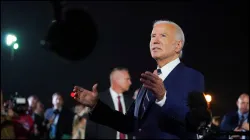Biden says killing of Hamas chief Ismail Haniyeh 'not helpful' for ceasefire in Gaza
The assassination of Hamas chief Ismail Haniyeh has triggered calls for retaliation from Iran and Hamas, who have blamed Israel for the attack. The brazen attack on Haniyeh in Tehran dealt a severe blow to Hamas and halted any immediate chances of a ceasefire in Gaza.

Washington: In a major statement, US President Joe Biden on Thursday (local time) said the assassination of Hamas leader and political bureau chief Ismail Haniyeh in Tehran was not helpful for achieving a ceasefire in the nearly ten-month-long war between Israel and Palestinian militant group in the Gaza. The killing of Haniyeh has sent shockwaves through Iran and threatened yet another escalation of tensions in the Middle East as Iranian officials have called for retaliation.
"It has not helped, That’s all I'm going to say right now," Biden told reporters late on Thursday while welcoming newly freed Americans at Joint Base Andrews, Maryland after a landmark prisoner exchange deal with Russia, when asked if Haniyeh's assassination ruined the chances for a ceasefire agreement. This came after Biden's talks with Israeli Prime Minister Benjamin Netanyahu, where he reaffirmed his commitment to Israel's security against all threats from Iran and its proxies.
Earlier, senior Hamas official Khalil Al-Hayya said Haniyeh was killed by a missile that hit him "directly" in a state guesthouse where he was staying in Tehran while attending Iranian President Masoud Pezeshkian's swearing-in ceremony. It later came to light that the Hamas leader was killed by an explosive device covertly smuggled into the guesthouse months ago, which was detonated remotely, killing one of Haniyeh's bodyguards as well.
The killing of Haniyeh, a crucial interlocutor in the Gaza ceasefire and hostage negotiations has ended any chance of an imminent agreement, Hamas sources and analysts say. The escalation will add to the many obstacles already facing Biden's ambitious diplomatic gamble to end the Gaza war, provide a path to Palestinian statehood with security for Israel and secure a US-Saudi-Israeli normalisation deal.
'Catastrophic failure' of Iranian intelligence
The brazen attack on Haniyeh has dealt a critical blow to the Palestinian militant group and exposed the 'catastrophic failure' of Iran's intelligence and security. The United States had earlier said it was not aware of the attempt on Haniyeh's life and neither was it responsible for the attack. However, Israeli officials had briefed the US and other Western governments about the operation in the immediate aftermath of the attack, the New York Times reported citing officials.
Iranian officials said such an attack, which evaded Iranian air defence systems, was a failure of Tehran's intelligence and security agencies and a "tremendous embarrassment" for the Iranian Revolutionary Guards Corp as the attack occurred in the heart of the country. The operation likely took months and required extensive surveillance of the compound.
The assassination threatened to unleash another wave of violence in the Middle East and upend the ongoing ceasefire talks to end the war in Gaza. While Israel has not claimed responsibility for the attack on Haniyeh, Iran and Hamas have accused it of carrying out the assassination and threatened retaliation. The Israel Defence Forces (IDF) said its military is on ‘high alert’ and ready to handle any threat, bracing for a potential response to the killings of Haniyeh and Hezbollah’s military chief Fuad Shukr in Beirut.
Haniyeh was the tough-talking face of Hamas' international diplomacy and represented the group in the months-long peace talks mediated by Egypt and Qatar. He enjoyed immunity in Qatar, where he was residing since 2019, and his death suggests that Netanyahu has shifted the rules of engagement by targeting him outside the country.
Iran Supreme Leader orders attack on Israel
Iran's Supreme Leader Ayatollah Ali Khamenei had ordered a "direct attack" on Israel in retaliation for Haniyeh's death, according to three Iranian officials, following an emergency meeting of Iran's Supreme National Security Council on Wednesday. Two Iranian sources told Reuters that Haniyeh's killing sent shockwaves through Iran's top leadership, who are now deeply concerned that their security forces may have been infiltrated by Israel.
Top Iranian officials will meet the representatives of Iran's regional allies from Lebanon, Iraq and Yemen on Thursday to discuss potential retaliation against Israel, according to sources. Representatives of Iran's Palestinian allies Hamas and the Islamic Jihad, as well as Yemen's Tehran-backed Houthi movement, Lebanon's Hezbollah and Iraqi resistance groups, will attend the meeting in Tehran. Another Iranian official said Khamenei and senior members of Iran's elite Revolutionary Guards will attend.
The US expressed concern about the potential for escalation, but the White House said it did not see that as imminent or inevitable and was working to prevent it from happening. Additionally, the US advised citizens not to travel to Lebanon, and two US airlines, United and Delta, paused flights to Tel Aviv.
Air India has also suspended scheduled flights to and from Tel Aviv in view of the escalating tensions. Earlier, Netanyahu said Israel had delivered crushing blows to Iran's proxies of late, including Hamas and Hezbollah, and would respond forcefully to any attack. Israeli air force chief Tomer Bar also warned that the country will act against anyone planning to harm its citizens.
(with inputs from agencies)
ALSO READ | Air India suspends all flights to and from Tel Aviv in view of escalating tensions in Middle East